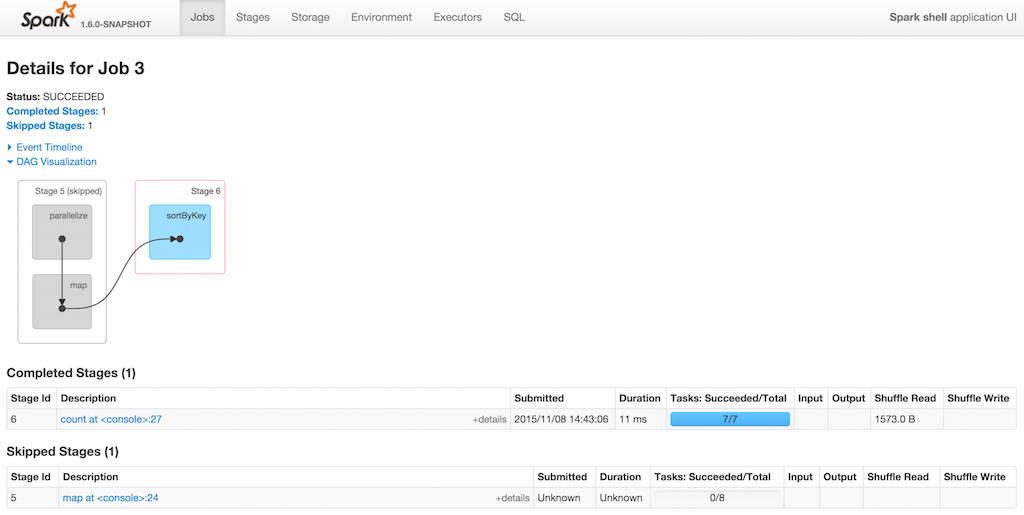addOutputLoc(partition: Int, status: MapStatus): UnitShuffleMapStage — Intermediate Stage in Execution DAG
ShuffleMapStage (aka shuffle map stage or simply map stage) is an intermediate stage in the physical execution DAG that corresponds to a ShuffleDependency.
|
Note
|
ShuffleMapStage can also be submitted independently as a Spark job for Adaptive Query Planning / Adaptive Scheduling.
|
|
Note
|
The logical DAG or logical execution plan is the RDD lineage. |
When executed, a ShuffleMapStage saves map output files that can later be fetched by reduce tasks. When all map outputs are available, the ShuffleMapStage is considered available (or ready).
Output locations can be missing, i.e. partitions have not been calculated or are lost.
ShuffleMapStage uses outputLocs and _numAvailableOutputs internal registries to track how many shuffle map outputs are available.
ShuffleMapStage is an input for the other following stages in the DAG of stages and is also called a shuffle dependency’s map side.
A ShuffleMapStage may contain multiple pipelined operations, e.g. map and filter, before shuffle operation.
A single ShuffleMapStage can be shared across different jobs.
| Name | Description |
|---|---|
ActiveJobs associated with the A new The list of |
|
Tracks MapStatuses for each partition. There could be many When The size of |
|
The number of available outputs for the partitions of the
|
Creating ShuffleMapStage Instance
ShuffleMapStage takes the following when created:
-
ididentifier -
rdd— theRDDofShuffleDependency -
numTasks— the number of tasks (that is exactly the number of partitions in therdd) -
parents— the collection of parent Stages -
firstJobId— the ActiveJob that created it -
callSite— the creationSite of the RDD -
shuffleDep— ShuffleDependency (from the logical execution plan)
ShuffleMapStage initializes the internal registries and counters.
|
Note
|
DAGScheduler tracks the number of ShuffleMapStage created so far.
|
|
Note
|
ShuffleMapStage is created only when DAGScheduler creates one for a ShuffleDependency.
|
Registering MapStatus For Partition — addOutputLoc Method
addOutputLoc adds the input status to the output locations for the input partition.
addOutputLoc increments _numAvailableOutputs internal counter if the input MapStatus is the first result for the partition.
|
Note
|
addOutputLoc is used when DAGScheduler creates a ShuffleMapStage for a ShuffleDependency and a ActiveJob (and MapOutputTrackerMaster tracks some output locations of the ShuffleDependency) and when ShuffleMapTask has finished.
|
Removing MapStatus For Partition And BlockManager — removeOutputLoc Method
removeOutputLoc(partition: Int, bmAddress: BlockManagerId): UnitremoveOutputLoc removes the MapStatus for the input partition and bmAddress BlockManager from the output locations.
removeOutputLoc decrements _numAvailableOutputs internal counter if the the removed MapStatus was the last result for the partition.
|
Note
|
removeOutputLoc is exclusively used when a Task has failed with FetchFailed exception.
|
Finding Missing Partitions — findMissingPartitions Method
findMissingPartitions(): Seq[Int]|
Note
|
findMissingPartitions is a part of Stage contract that returns the partitions that are missing, i.e. are yet to be computed.
|
Internally, findMissingPartitions uses outputLocs internal registry to find indices with empty lists of MapStatus.
ShuffleMapStage Sharing
A ShuffleMapStage can be shared across multiple jobs, if these jobs reuse the same RDDs.
When a ShuffleMapStage is submitted to DAGScheduler to execute, getShuffleMapStage is called.
scala> val rdd = sc.parallelize(0 to 5).map((_,1)).sortByKey() (1)
scala> rdd.count (2)
scala> rdd.count (3)-
Shuffle at
sortByKey() -
Submits a job with two stages with two being executed
-
Intentionally repeat the last action that submits a new job with two stages with one being shared as already-being-computed

Returning Number of Available Shuffle Map Outputs — numAvailableOutputs Method
numAvailableOutputs: IntnumAvailableOutputs returns _numAvailableOutputs internal registry.
|
Note
|
numAvailableOutputs is used exclusively when DAGScheduler submits missing tasks for ShuffleMapStage (and only to print a DEBUG message when the ShuffleMapStage is finished).
|
Returning Collection of Active Jobs — mapStageJobs Method
mapStageJobs: Seq[ActiveJob]mapStageJobs returns _mapStageJobs internal registry.
|
Note
|
mapStageJobs is used exclusively when DAGScheduler is notified that a ShuffleMapTask has finished successfully (and the task made ShuffleMapStage completed and so marks any map-stage jobs waiting on this stage as finished).
|
Registering Job (that Computes ShuffleDependency) — addActiveJob Method
addActiveJob(job: ActiveJob): UnitaddActiveJob registers the input ActiveJob in _mapStageJobs internal registry.
|
Note
|
The ActiveJob is added as the first element in _mapStageJobs.
|
|
Note
|
addActiveJob is used exclusively when DAGScheduler is notified that a ShuffleDependency was submitted (and so a new ActiveJob is created to compute it).
|
Deregistering Job — removeActiveJob Method
removeActiveJob(job: ActiveJob): UnitremoveActiveJob removes a ActiveJob from _mapStageJobs internal registry.
|
Note
|
removeActiveJob is used exclusively when DAGScheduler cleans up after ActiveJob has finished (regardless of the outcome).
|
Removing All Shuffle Outputs Registered for Lost Executor — removeOutputsOnExecutor Method
removeOutputsOnExecutor(execId: String): UnitremoveOutputsOnExecutor removes all MapStatuses with the input execId executor from the outputLocs internal registry (of MapStatuses per partition).
If the input execId had the last registered MapStatus for a partition, removeOutputsOnExecutor decrements _numAvailableOutputs counter and you should see the following INFO message in the logs:
INFO [stage] is now unavailable on executor [execId] ([_numAvailableOutputs]/[numPartitions], [isAvailable])|
Note
|
removeOutputsOnExecutor is used exclusively when DAGScheduler cleans up after a lost executor.
|
Preparing Shuffle Map Outputs in MapOutputTracker Format — outputLocInMapOutputTrackerFormat Method
outputLocInMapOutputTrackerFormat(): Array[MapStatus]outputLocInMapOutputTrackerFormat returns the first (if available) element for every partition from outputLocs internal registry. If there is no entry for a partition, that position is filled with null.
|
Note
|
In both cases, |